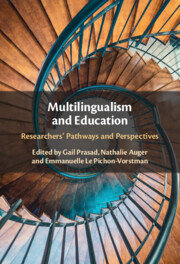Book contents
- Multilingualism and Education
- Multilingualism and Education
- Copyright page
- Contents
- Figures
- List of Contributors
- 1 Humanizing Research(ers) and Understanding How Concepts Evolve in Context
- 2 Become a Teacher-Researcher to Find Your Turkish
- 3 Between Languages, Norms and Social Variations
- 4 Learning to Language, Learning to Live:
- 5 A Retrospective Look at Multi/Pluri/Linguistic Transformations
- 6 Multilingualism as Lived, Felt and Evolving through Dialogue and Melody of Life
- 7 Revisiting the “Plurilingual-Intercultural” Orthodoxy
- 8 The Languages That Started to Flourish in Our Childhood, Developed over Time into Beautiful Blooming Meadows
- 9 On the Borderline between Languages and Knowledge
- 10 Multilingualism as Part of Social Reality
- 11 Some Elements of Family History and Language Biography
- 12 My Trajectory in Languages and Language Learning
- 13 Multilingualism as Norm
- 14 From Patois to Inter-comprehension Issues
- 15 Biography, Linguistic Coexistence, and Epistemological Reflection
- 16 Fighting off Zombies in France’s Multilingual Education
- 17 From Language Planning to the Didactization of Plurilingualism
- 18 A Sociolinguistic Biography and Understandings of Bilingualism
- 19 Experiential and Research Journey
- 20 Multimodality and Multilingualism
- 21 Researching Multilingualism and Language Education across Borders and over Decades
- 22 Possible Selves
- 23 Feeling at Home across Languages, Schools and Countries
- 24 From Monolingual Habitus to Plurilingual Education
- 25 My Path toward Awareness of Languages and Linguistic Diversity
- 26 A Personal Journey
- 27 Cultivating Plurilingual Gardens
- 28 Unbecoming a Monolingual Anglophone
- 29 From Plurilingual Experiences to Pluri-Artistic Practices
- 30 A Personal and Professional Journey to Multilingualism
- 31 Journey towards a Translanguaging Pedagogy for Social Justice
- 32 From Language Biography to a Research Life’s Journey
- 33 My Linguistic Biography
- 34 Travelling Back and Forth between Local Language Variation and Global Multilingualism
- 35 A Reflection on Generational Diaspora and Resulting Linguistic Acclimatization
- 36 On Language(s), Education and Dynamic Language Users
- Index
- References
20 - Multimodality and Multilingualism
Biographical Notes, Key Concepts, and Practices
Published online by Cambridge University Press: 02 June 2022
- Multilingualism and Education
- Multilingualism and Education
- Copyright page
- Contents
- Figures
- List of Contributors
- 1 Humanizing Research(ers) and Understanding How Concepts Evolve in Context
- 2 Become a Teacher-Researcher to Find Your Turkish
- 3 Between Languages, Norms and Social Variations
- 4 Learning to Language, Learning to Live:
- 5 A Retrospective Look at Multi/Pluri/Linguistic Transformations
- 6 Multilingualism as Lived, Felt and Evolving through Dialogue and Melody of Life
- 7 Revisiting the “Plurilingual-Intercultural” Orthodoxy
- 8 The Languages That Started to Flourish in Our Childhood, Developed over Time into Beautiful Blooming Meadows
- 9 On the Borderline between Languages and Knowledge
- 10 Multilingualism as Part of Social Reality
- 11 Some Elements of Family History and Language Biography
- 12 My Trajectory in Languages and Language Learning
- 13 Multilingualism as Norm
- 14 From Patois to Inter-comprehension Issues
- 15 Biography, Linguistic Coexistence, and Epistemological Reflection
- 16 Fighting off Zombies in France’s Multilingual Education
- 17 From Language Planning to the Didactization of Plurilingualism
- 18 A Sociolinguistic Biography and Understandings of Bilingualism
- 19 Experiential and Research Journey
- 20 Multimodality and Multilingualism
- 21 Researching Multilingualism and Language Education across Borders and over Decades
- 22 Possible Selves
- 23 Feeling at Home across Languages, Schools and Countries
- 24 From Monolingual Habitus to Plurilingual Education
- 25 My Path toward Awareness of Languages and Linguistic Diversity
- 26 A Personal Journey
- 27 Cultivating Plurilingual Gardens
- 28 Unbecoming a Monolingual Anglophone
- 29 From Plurilingual Experiences to Pluri-Artistic Practices
- 30 A Personal and Professional Journey to Multilingualism
- 31 Journey towards a Translanguaging Pedagogy for Social Justice
- 32 From Language Biography to a Research Life’s Journey
- 33 My Linguistic Biography
- 34 Travelling Back and Forth between Local Language Variation and Global Multilingualism
- 35 A Reflection on Generational Diaspora and Resulting Linguistic Acclimatization
- 36 On Language(s), Education and Dynamic Language Users
- Index
- References
Summary
Through the perspectives of raciolinguistics, language ideology, power, and identity, Kendall King explores the tectonics of theoretical changes in applied linguistics over the last thirty years. She challenges the concepts of the native speaker, motivation, and even the notion of language itself. From the study of language loss, maintenance, and revitalization, she moved to superdiverse contexts. She discovered the hybridity and fluidity of languages and cultures, and shifted toward a more holistic view of bilingualism and bilinguals.
Keywords
- Type
- Chapter
- Information
- Multilingualism and EducationResearchers' Pathways and Perspectives, pp. 168 - 175Publisher: Cambridge University PressPrint publication year: 2022



